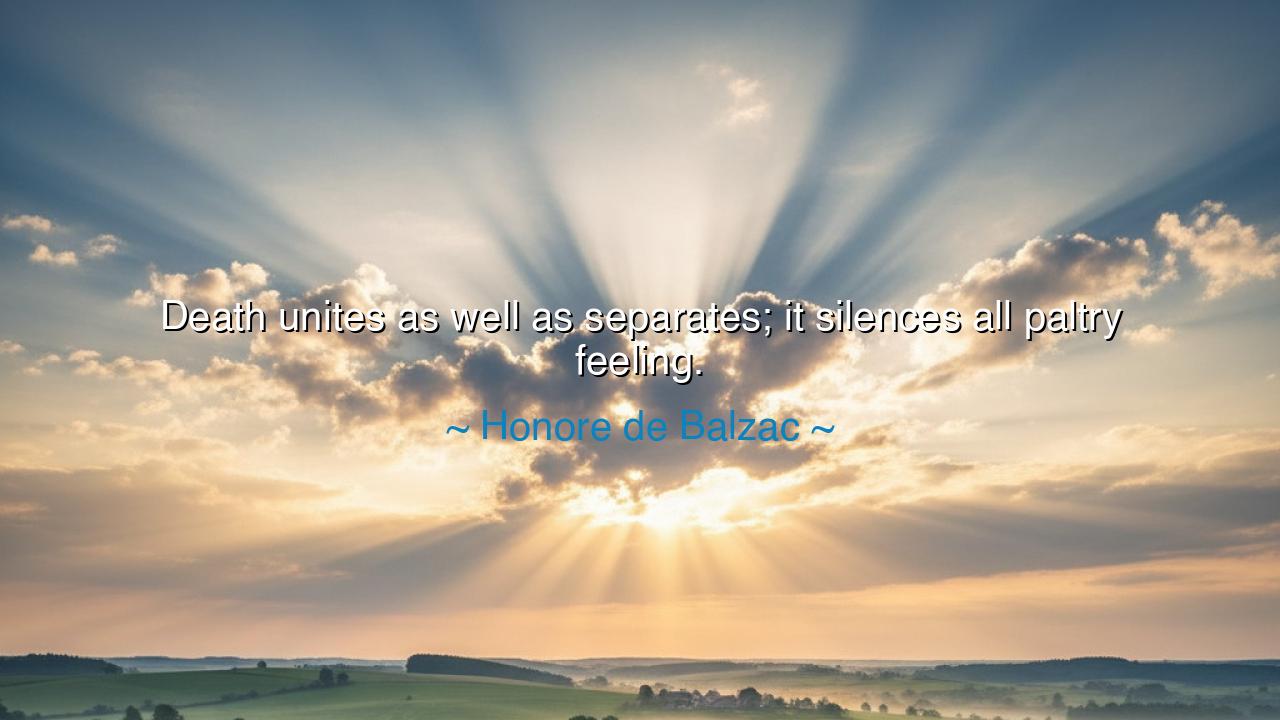
Death unites as well as separates; it silences all paltry






“Death unites as well as separates; it silences all paltry feeling.” Thus wrote Honoré de Balzac, the great French novelist, whose pen traced the deepest currents of the human heart. In these words, he distills one of life’s most profound paradoxes — that death, which tears bodies apart and ends all earthly bonds, also possesses the strange and solemn power to unite. It gathers all men, rich and poor, lover and enemy, beneath its shadow, and strips away the vanity and pride that divide them in life. In the face of death, Balzac tells us, the paltry feelings — jealousy, resentment, greed, and spite — fall silent, as if the soul itself bows before something greater than all its quarrels.
The origin of this thought lies in Balzac’s lifelong meditation on human nature. In his monumental work La Comédie Humaine, he portrayed every shade of human emotion — ambition, love, betrayal, sorrow, and pride. Yet through all his stories, one truth repeats like a quiet drumbeat: that mortality humbles all. The powerful and the powerless, the sinner and the saint — all are leveled by the same hand. Balzac lived in an age of upheaval, when France had seen revolutions, empires, and ruins. He witnessed how men clung to power and wealth, and how swiftly death erased their importance. It was from this keen observation that he wrote these words: not with bitterness, but with understanding. Death, in his view, is the great reconciler — the moment when the masks fall, and what remains is not hatred, but humanity.
When Balzac says that death unites as well as separates, he speaks not only of the spiritual unity between souls but of the emotional reconciliation it brings among the living. How often have we seen families divided by pride, only to come together at the passing of one they loved? In the silence of mourning, the quarrels that once seemed vast shrink into dust. The tears shed beside a coffin wash away anger and awaken tenderness. In this way, death restores the bonds that life had broken. It is cruel, yes — for it takes — but it also redeems, for it teaches compassion. It shows us that what truly matters is not the victory of one ego over another, but the simple act of loving before time runs out.
There is a story from the life of Abraham Lincoln that embodies this truth. During the American Civil War, Lincoln faced unimaginable grief — the loss of his son, and the deaths of thousands of his countrymen. Yet, when the war ended, and the assassinated president was laid in his tomb, those who had hated him wept beside those who had loved him. Death silenced all paltry feeling. The bitterness that had divided a nation was, if only for a moment, quieted by the solemn majesty of mortality. Enemies saw in Lincoln not a rival, but a man — weary, flawed, and noble. Thus, in death, he became the father of both North and South, uniting the very hearts his life had struggled to reconcile.
To say that death “silences all paltry feeling” is to recognize its purifying power. In its presence, the shallow vanities that consume us — our envies, our grudges, our endless comparisons — fade into insignificance. Death commands a silence that is not emptiness but reverence. It reminds us of the brevity of existence, and in that reminder, it calls us back to humility. The quarrels of yesterday become meaningless beside the eternal rest of one who is gone. Thus, Balzac does not glorify death, but urges us to learn from it while we live: to silence the petty within ourselves before death must do it for us.
The ancients, too, understood this. The philosophers of Greece and Rome, from Epictetus to Marcus Aurelius, taught that to contemplate death is to purify the soul. “Remember you must die,” they said — not to frighten, but to awaken. For when one remembers death, pride loses its grip, and kindness grows strong. Every act of forgiveness, every word of love, every sacrifice made for another — these are born from the awareness that time is precious, and that tomorrow is never promised. Death unites us because it is the one destiny we all share; it silences our pettiness because it reminds us of what endures beyond all difference — the capacity to love and to be loved.
The lesson, then, is clear: live as though death were already teaching you. Do not wait for the grave to silence the lesser parts of your heart. Let death’s wisdom shape your life — by forgiving quickly, by speaking truth gently, by seeking reconciliation before regret. When you are wronged, remember that anger dies; when you are envied, remember that fame fades; when you are tempted by pride, remember that dust awaits us all. To live with this awareness is not to be morbid, but to be truly awake — to see life not as a possession, but as a sacred opportunity to love well before the silence comes.
So remember the words of Honoré de Balzac: Death unites as well as separates; it silences all paltry feeling. Let this truth settle in your heart like the tolling of a distant bell. Let it remind you that every division, every quarrel, every pettiness is but a shadow before the eternal light. Live, then, not in fear of death, but in reverence for life — for in learning to see as death sees, you will at last begin to live as the soul longs to live: united, humble, and free of all that is small.






AAdministratorAdministrator
Welcome, honored guests. Please leave a comment, we will respond soon